人教版八年级下册英语Unit4知识点教学教材
人教版英语八年级下册Unit4 SectionB教材知识详解
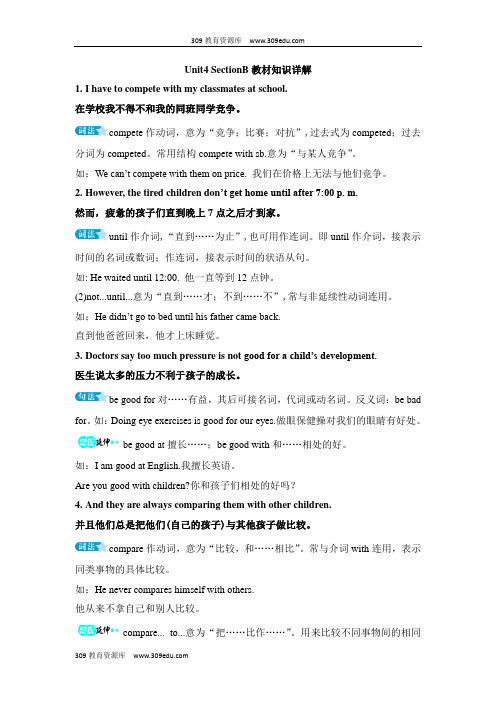
Unit4 SectionB教材知识详解1.I have to compete with my classmates at school.在学校我不得不和我的同班同学竞争。
compete作动词,意为“竞争;比赛;对抗”,过去式为competed;过去分词为competed。
常用结构compete with sb.意为“与某人竞争”。
如:We can’t compete with them on price. 我们在价格上无法与他们竞争。
2.However, the tired children don’t get home until after 7:00 p. m.然而,疲惫的孩子们直到晚上7点之后才到家。
until作介词,“直到……为止”,也可用作连词。
即until作介词,接表示时间的名词或数词;作连词,接表示时间的状语从句。
如: He waited until 12:00. 他一直等到12点钟。
(2)not...until...意为“直到……才;不到……不”,常与非延续性动词连用。
如;He didn’t go to bed until his father came back.直到他爸爸回来,他才上床睡觉。
3.Doctors say too much pressure is not good for a child’s development.医生说太多的压力不利于孩子的成长。
be good for对……有益,其后可接名词,代词或动名词。
反义词:be bad for。
如:Doing eye exercises is good for our eyes.做眼保健操对我们的眼睛有好处。
be good at擅长……;be good with和……相处的好。
如:I am good at English.我擅长英语。
Are you good with children?你和孩子们相处的好吗?4.And they are always comparing them with other children.并且他们总是把他们(自己的孩子)与其他孩子做比较。
人教版八年级英语下册教案(RJ) Unit 4
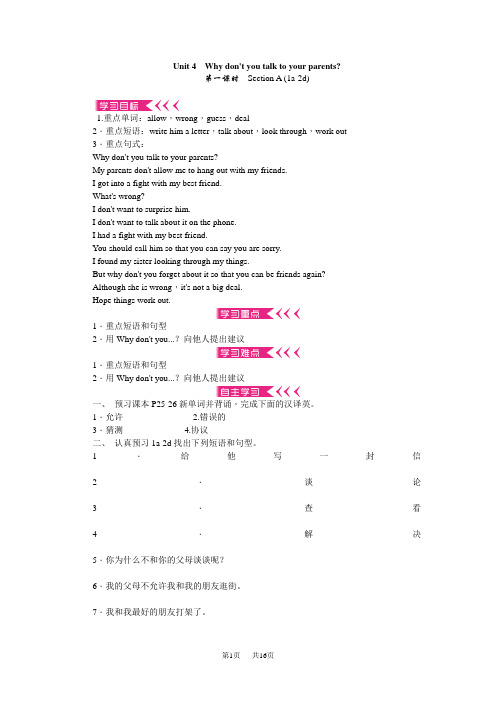
Unit 4Why don't you talk to your parents?第一课时Section A (1a-2d)1.重点单词:allow,wrong,guess,deal2.重点短语:write him a letter,talk about,look through,work out3.重点句式:Why don't you talk to your parents?My parents don't allow me to hang out with my friends.I got into a fight with my best friend.What's wrong?I don't want to surprise him.I don't want to talk about it on the phone.I had a fight with my best friend.You should call him so that you can say you are sorry.I found my sister looking through my things.But why don't you forget about it so that you can be friends again?Although she is wrong,it's not a big deal.Hope things work out.1.重点短语和句型2.用Why don't you...?向他人提出建议1.重点短语和句型2.用Why don't you...?向他人提出建议一、预习课本P25-26新单词并背诵,完成下面的汉译英。
1.允许____________ 2.错误的____________3.猜测____________ 4.协议____________二、认真预习1a-2d找出下列短语和句型。
新人教版八年级下册英语unit-4

Unit 4 Why don't you talk to your parents?一.基本知识点1。
Why don’t you talk to your parents? 你为什么不和你打父母谈谈呢?Why don’t you do sth ?= Why not do sth?为什么不..。
.。
.呢?2。
My parents don’t allow me to hang out with my friends. 我的父母不允许我和我的朋友们出去闲逛。
allow sb。
to do sth 允许某人做某事【拓展】allow v 允许allow doing sth 允许做某事They don’t allow smoking。
allow sb. to do sth 允许某人做某事My mother allows me to watch TV.be allowed to do sth 被允许做某事3。
What’s wrong? 怎么啦?【解析】What’s wrong( with sb。
/ sth) (某人/物) 怎么了?4。
look through 浏览5.work out 解决;成功地发展,后跟fine,well,badly等词,表明产生的结果如何.The teachers encourage their students to ____ the problems by themselves, and in this way students can enjoy success。
A。
give up B。
work out C. look through5。
get on with sb. 和某人和睦相处;和某人关系良好=get along withget on well/ badly with 相处的好/坏My problem is I can’t get on with my favorite. 我的问题是我不能喝我的家人和睦相处。
人教版八年级英语下册Unit4全单元课件(共128张ppt)
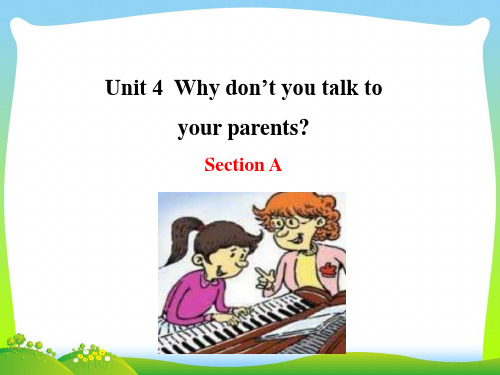
【用法辨析】“说”不同
及物动词, 常用于: tell sb. sth. =tell sth. to sb. 告诉 tell 某人某事
【归纳拓展】提出建议的句型
【活学活用】
①—Why don’t you
John a toy car for his birthday?
—Good idea! He is crazy about cars.
A. buy
B. buying
C. to buy
D. buys
②Why not go out for a rest? (改为同义句)
13、He who seize the right moment, is the right man.谁把握机遇,谁就心想事成。2021/7/212021/7/212021/7/212021/7/217/21/2021
14、谁要是自己还没有发展培养和教育好,他就不能发展培养和教育别人。2021年7月21日星期三2021/7/212021/7/212021/7/21
__c___ ___b__
3a Read the letters and complete the chart.
Problems
Advice
I can’t get on with my family.
talk about these feelings with your family
My parents fight a lot.
Unit 4 Why don’t you talk to your parents?
Section A
Lead in Look at these problems. Can you give some advice?
八年级英语下册:Unit 4 He said I was hard-working知识点复习(人教新

Unit 4 He said I was hard-working.一. 教学内容:Unit 4 He said I was hard-working.二. 教学目标:学习如何转述别人所叙述的内容。
三. 教学过程:1. 重点词及短语。
1. 直接引语和间接引语。
(一)重点词汇:1. ever: adv. 曾经,永远(1)Do you ever watch soap opera?(2)I hardlyever(几乎不曾)go to the concert.(3)True love should last forever. (永远)2. mad: adj. 疯狂的,狂热的(1)be mad at/ with sb. 生……的气(同义词组be angry with sb. )(2)be mad for sth. 因……事而生气ex: He is mad _________ his son _________ telling a lie.3. not … any more 不再……(1)He didn’t live here any more. 他不再住这里了。
(2)She wasn’t mad at me anymore. 她不再生我的气了。
4. first of all 首先5. message: n. 消息,信息(1)为某人捎个口信:①take a message _________sb.②give sb. a message(2)给某人留个口信:_________ a message _________sb.(3)传信给某人:_________ _________ a message to sb.ex: ①He left a _________ saying he would e back in a week.A. informationB. messageC. newsD. word②Can I _________ a message for you?A. bringB. leaveC. takeD. pass6. pass on 传递,继续前进①学生们在传球。
英语人教版新目标八年级下册知识整理Unit4

【英语】八年级||下册教材全梳理(Unit4 He said I was hard -working )知识·巧学生词巧解【词析】音析:元音字母a读[].形析:形近词sad(忧愁的;悲哀的)义析:angry and crazy【典句】He was mad with joy.他欣喜假设狂.【拓展】固定搭配:be mad at/with =be angry with/at 生……的气【词析】音析:元音字母a发[e],ore在词尾读作[].形析:any(任何) +more(更多)义析:any longer,from now on【典句】He doesn ,t come here anymore.他再也不到这儿来了.【拓展】可构成not...anymore词组,也可写成no more .表达"不再〞的词组还有not...any longer/no longer,no more 和no longer用于句末.【辨析】not...anymore/no more与not...any longer/no longernot...anymore/no more指做某事次数不再增加,多与瞬间动词连用;not...any longer/no longer指时间上不再延续,多与持续性动词连用.first of all 首||先【词析】形析:first(第|一) +of +all(所有)义析:at first,the beginning【典句】First of all,you should think,and then speak.你应该先考虑,后开口.【拓展】first of all的同义词为at first,反义词为at last,in the end,finally等.【词析】音析:元音字母e发[e],a发[I].形析:mess(混乱) +age(年龄)义析:information,news sent to sb.in writing or speech【典句】Will you take this message to your brother?把这个便条捎给你哥哥好吗?【拓展】与message有关的词组有:give sb. a message 给……传个口信take a message for sb. 为……捎个口信leave a message 留言pass on 传递【词析】义析:take sth.to different places【典句】Let us now pass on to the next subject.现在让我们看看下一个题目.【拓展】后接宾语时可以构成pass on sth. to sb./pass on sb. sth.,当宾语为代词时只能用前一种.【词析】音析:重读开音节词,u读作[],元音字母o发本音[].形析:sup(超) +pose(姿态)义析:think about sth.that is not real now【典句】Let ,s suppose (that) the news is true.让我们假定这消息是真的 .【拓展】固定搭配:be supposed to被期望或被要求do well in 在……方面做得好【典句】I do well in drawing.我擅长画画.【拓展】be good at 相当于do well in,意思为"擅长……〞.be good at 的比较级||为be better at,do well in 的比较级||为do better in .be in good health 身体健康【词析】形析:be +in(在……状态下) +good(好的) +health(健康)义析:keep healthy,keep fit【典句】I hope you are in good health.我希望你身体健康.【拓展】表示身体健康的其他短语有:be healthy 健康的stay/keep healthy 保持健康【词析】形析:er读作[],ou读作[].形析:nerv(e)(神经的) + -ous(形容词后缀)义析:not relaxed,not comfortable【典句】I felt very nervous when I went into his office.当我走进他的办公室时,我感到很紧张.【拓展】固定搭配:be nervous about对……感到紧张【词析】音析:重读闭音节词,字母u读作[],i和y读作[I].形析:lucky(幸运的)变y为i + -ly(副词后缀)义析:fortunately【典句】Luckily,the police came right away.很幸运,警察马上就来了.【拓展】1)同根词:luck n.运气;lucky adj.幸运的2)反义词:unluckily【词析】音析:元音字母u读作[],词尾的e不发音.形析:形近词blue(蓝色)义析:right,not against【典句】Is it true that you are rich?你很富有是真的吗?【拓展】同根词:truth n.真理;truly adv.真实地【词析】音析:ow读作[].形析:形近词town(城镇)义析:belong to oneself【典句】She makes her own clothes.她自己做衣服.【拓展】own作为形容词意为"自己的〞,常用在表示所有格的词后起强调作用.作为动词意为"拥有〞,名词为owner(主人) .轻轻告诉你Every heart has its own sorrow.各人有各人的苦恼.get over 克服;恢复;原谅【词析】形析:get(得到) +over(在上面)义析:recover,forgive sb.【典句】Can we get over this difficulty?我们能克服这个困难吗?【拓展】与get有关的词组有:get to 到达get on 上车get off 下车get ready for 为……作准备get up 起床【词析】音析:第|一个a读作[],第二个a读作[I] .义析:person who finish the study in a college【典句】Two thirds of the graduates find jobs.三分之二的毕业生找到了工作.【拓展】作为动词意为"毕业〞可构成graduate from "毕业于……〞.【词析】音析:闭音节词,字母i读作\I\] .形析:形近词than(比)义析:not dense or concentrated【典句】The air there is very thin.那里的空气很稀薄.【拓展】作"稀薄的〞讲时反义词为thick,作"瘦的〞讲时反义词为fat .【词析】音析:字母e和i均读作[I],sion读作[].形析:deci(de)(决定) +sion(名词后缀)义析:something you must make a choice at one time【典句】She could not make a decision about the dresses.她对(买不买)这衣服下不了决心.【拓展】make a decision to do sth. =decide to do sth.(决定做某事)【词析】音析:ar读作[].形析:star(星星) +t义析:begin【典句】If you are ready,you may start your work.如果你准备好了,你可以开始工作了.【拓展】start作为动词"开始〞时与begin同义,其后可接动名词或动词不定式.【辨析】begin与start一般情况下,这两个词都可接动名词或动词不定式,二者用法相同.以下两种情况下只能用start,而不用begin .1)当机器"开动、发动〞时.2)作为"旅途〞开始时.care for 照顾,照料【词析】形析:care(关心) +for(为了……)义析:take care of,look after【典句】The boy is too young to care for himself.这个男孩太小,不能照顾自己.【词析】音析:元音字母a发本音[eI],字母组合er发[].形析:d +anger (愤怒)义析:risk;a source or an instance of risk or peril【典句】In war,life is full of danger for everyone.在战争中,每个人的生活都充满了危险.【拓展】1)与danger有关的词组有:in danger 在危险中out of danger 出险;脱险2)danger的形容词形式:dangerous例句精讲Section ALana thinks she ,s coming to my house to study.拉娜以为她要到我家来学习.【巧解句构】这是一个含有宾语从句的主从复合句,主句为一般现在时态,从句是用趋向性动词come的现在分词表将来.【拓展延伸】宾语从句的时态必须与主句照应:当主句中谓语是现在或将来时态,从句谓语不受主句谓语时态的影响,可以按需要使用任何时态,例如:She says that she has never been to Mount Tai.1)当主句谓语为过去时态,从句中的时态一般为过去的某种时态.例如:He said he had finished his homework.2)当从句表达的是某一客观真理(事实)时,主句无论是何种时态,从句那么用一般现在时.例如:He said that light travels much faster than sound.误区警示假设宾语从句跟在动词think,believe,suppose,expect等表示"要,认为〞等的动词后时,句子的否认表达在主句上,这就是"否认转移〞现象.例如:I don ,t think you are right.我认为你不正确.I don ,t believe he has finished his work.我相信他还没有完成他的工作.Section B 3a1.I was sorry to hear that he had a cold last week.我听说他上周感冒了觉得很难过.【巧解句构】这是一句包含宾语从句的主从复合句.主句是过去时态,从句也用过去时态.本句中that变为了宾语从句he had a cold last week的引导词.【要点剖析】I was sorry to hear that...是表示遗憾的常用语,意为"我听到……很遗憾〞.have a cold意为"患感冒〞还可以写成catch a cold .类似的词组还有:have a cough 咳嗽have a fever 发烧have a headache 头疼2.I had a really hard time with science this semester,and I wasn ,t surprised to find that my worst report was from my science(科学)teacher.这学期我的科学课学得确实很吃力,所以当我看到最||糟糕的评价来自于科学课老师时,我毫不吃惊.【巧解句构】这是一句由and连接的并列句.前一个分句是简单句,后一个分句是包含宾语从句的主从复合句,主句I wasn ,t surprised to find "我毫不吃惊地发现……〞,不定式的动词find后面带一个由that引导的宾语从句.【要点剖析】词组have a hard time with sth.意为"应付某事很费力〞;be surprised to意为"对……感到吃惊〞,不定式后接动词的原形.surprised为形容词,surprise为名词构成to one ,s surprise(使……惊奇的是)词组.【辨析比较】surprised 和surprising1)当人作主语或修饰与人有关的词时用以ed结尾的形容词.2)当物作主语或修饰与物有关的词时用以ing结尾的形容词.例如:We are surprised to hear the surprising news.我们听到那条令人惊讶的新闻感到非常吃惊.3.The good news is that my math teacher said I was hard -working.好消息是数学老师说我很用功 .【巧解句构】这是一句包含表语从句的主从复合句 .主句the good news is使用的是一般现在时,表示目前的情况.由that引导的从句my math teacher said I was hard working在句中充当表语,使用的是一般过去时,陈述过去.其中又包含一个从句I was hard working,作said的宾语.【拓展延伸】表语从句于主句中的系动词之后,主要有四类:1)由连词who,what,which 等引导的表语从句.这些词不但可以起连接作用,还可以在句中作主语、宾语和表语.例如:China is not what she was yesterday.中|国已不再是以前的那个中|国了.2)由不充当任何句子成分的连词that,whether引起的表语从句.例如:What I mean is that we should help each other.我的意思是我们应该互相帮助.The problem is whether we can finish the work on time.问题是我们能不能按时完成工作.3)由连接副词when,where,why,how 引导的表语从句 .例如:This is when I really get to know Americans.我这时才开始认识美|国人.4)由连词as,because,as if,as though 引导的表语从句.例如:It looks as if it is going to rain tonight.看起来好似今晚要下雨.Self Check 2Last week in school we had a big fight,and she didn ,t talk to me.上周在学校我们大吵了一架,她不和我说话了 .【巧解句构】这是一个and连接的前后均是一般过去时态的并列句.【要点剖析】1)短语have a fight意为"吵架〞,后面接宾语时要加上介词with,即have a fight with等同于fight with sb.(此时的fight为动词) .2)短语talk to sb.意为"与……谈话/交谈〞,to也可以被with替换 .如果talk后面接的是"某事〞那么介词用about即talk about sth. .She said helping others changed her life.1.Teaching high school students in a poor mountain village in Gansu Province may not sound like fun to you.在甘肃省一个贫困山村教中学生,在你听来也许并不有趣 .【巧解句构】该句是个简单句.这句话的主语很长,一个动名词短语(teaching high school students "教中学生〞)加上两个地点状语(in a poor mountain village "贫困山村〞和in Gansu Province "甘肃省〞)构成了本句的主语.谓语局部那么使用了sound like短语,表示"听来并不有趣〞.【要点剖析】短语sound like 意为"听起来像……〞,sound是一个系动词,类似的词还有:feel,smell,taste,look,get,turn等.2.She said that both she and her husband thought this was a good idea.她和她丈夫都认为这是一件很好的事.【巧解句构】该句是个复合句,said后面的that引导的是宾语从句,是said的内容;句中的thought后面也是一个宾语从句,但省略了引导词that .通常宾语从句由that引导时,常可省去that,但said后的that常保存.【要点剖析】词组both...and...意为"(两者)都〞是并列连词可以连接两个人或物一起作主语.反义词为neither...nor...,它们的用法不同:neither...nor...引导的词作主语时谓语动词与nor 后的词保持一致即就近原那么;both...and...无此用法 .3.There is no difference between you and them.你和他们之间没有不同.【巧解句构】该句是一个there be句型,名词difference作句子的真正主语,no相当于not any .There is no difference between...and...意为"在……和……之间没有区别〞 .如果表示"有区别〞,那么使用There is a difference between...and...或者There are differencesbetween...and... .【要点剖析】词组between...and...表示"在……之间〞,between只用于二者之间.【拓展延伸】there be句型的一些用法:1)主谓一致谓语动词要采取就近一致原那么,和靠近be的主语一致.例如:There is a pen,two rulers in the box.盒子里有一只钢笔,两把尺子.There are two boys and a teacher at the school gate.门口有两个男孩,一个老师.2)主语后的动词形式在there be 句型中,主语与动词是主动关系时用现在分词;是被动关系时用过去分词.例如: There is a purse lying on the ground.地上有一个钱包.There are five minutes left now.现在还有5分钟.3)反意疑问句反意疑问句应与there be对应,而不是依据主语.例如:There is a radio on the table,isn ,t there?桌子上有一台收音机,是吧?There are more than fifty classes in your school,aren ,t there?你们学校有50个班,是吧?4)there be 与have的替换there be表示所属时可与have替换.There is nothing but a book in my bag. =I have nothing but a book in my bag.在我包里只有一本书.记忆要诀there be 句型的谓语歌诀there be句型可译"有〞,be 动词跟着名词走.名词单数不可数,当用is记清楚.如果名词是复数,用are一定要记住.出现并列主语特殊记, "就近原那么〞用仔细.4.I can open up my students , eyes to the outside world and give them a good start in life.我能为我的学生翻开眼界看外面的世|界,并且给他们的生活一个好的开始 .【巧解句构】该句是一个含有情态动词的一般现在时态的简单句,and连接前后两个并列谓语.【要点剖析】1)短语open up one ,s eyes 意为"使……开眼界〞.2)动词give有两种用法:give sb. sth.和give sth. to sb. .5.When her year was over,she said that she would return to the area after finishing her studies.一年期满时她说:毕业后她会回到这个地方.【巧解句构】该句是个包含时间状语从句和宾语从句的主从复合句.时间状语从句when her year was over意为"当她的一年(支教)期结束时……〞.主句是一个间接引语,that...studies作said的宾语从句,时态为过去将来时,说明是在"当时〞要离开的时候,杨蕾承诺"将来〞要回到这个地方;在这个宾语从句中after finishing her studies作为一个时间状语,点明了她将要回来的时间为"完成学业后〞.【要点剖析】1)短语be over意为"结束〞.2)return to...意为"返回……〞.语法解读直接引语和间接引语引述或转述别人的话称为"引语〞.直接引用别人的原话,两边用引号"〞标出,叫做直接引语;用自己的语言转述别人的话,不需要引号,叫做间接引语,实际上间接引语大都是宾语从句,其中由祈使句转换的间接引语除外,其转换后是不定式.那么直接引语为陈述句、一般疑问句、特殊疑问句和祈使句,转换为间接引语时,句子的结构,人称、时态、时间状语和地点状语等都要有变化,如何变化呢?一、人称的转变下面有一句顺口溜"一随主,二随宾,第三人称不更新〞可以帮助我们记忆."一随主〞是指在直接引语变间接引语时,如果从句中的主语是第|一人称或被第|一人称所修饰,从句中的人称要按照主句中主语的人称变化.例如:He said, "I am very happy.〞He said that he was very happy."二随宾〞是指直接引语变间接引语时,假设从句中的主语及宾语是第二人称或被第二人称所修饰,从句中的人称要跟引号外的主句的宾语一致.如果引号外的主句没有宾语,也可以用第|一人称,例如:She said to her son, "I ,ll check your homework tonight.〞She said to her son that she would check his homework that night."You should be more careful next time,〞my grandfather said.My grandfather said that I should be more careful the next time."第三人称不更新〞是指直接引语变间接引语时,如果从句中的主语及宾语是第三人称或被第三人称所修饰,从句中的人称一般不需要变化.例如:Mr.Smith said, "Jack is a good student.〞→ Mr.Smith said Jack was a good student.总之,人称的转换不是固定的,具体情况、具体对待,要符合逻辑.二、时态的转换直接引语改为间接引语时,主句中的谓语动词如果是过去时,从句(即间接引语局部)的谓语动词在时态方面要作相应的变化,变成过去时范畴的各种时态(实际也是宾语从句的时态要求),变化如下:一般现在时→一般过去时现在进行时→过去进行时现在完成时→过去完成时一般将来时→过去将来时一般过去时→过去完成时过去完成时→不变过去进行时→不变例如:1. "I am very glad to visit the Great Wall ,〞she said.→She said she was very glad to visit the Great Wall.2.Jim said, "We are listening to the music.〞→Jim said that they were listening to the music.3.Mother asked, "Have you finished your homework before nine o ,clock?〞→Mother asked me whether I had finished my homework before nine o ,clock.4.He asked the policeman, "Where shall I find the nearest bookshop?〞→He asked the policeman where he would find the nearest bookshop.5. "Why did she go there?〞the teacher asked.→The teacher asked why she had gone there.6.Mother asked me, "Had you finished your homework before supper?〞→Mother asked me whether I had finished my homework before supper.7.Tom said, "We were having a football match this time yesterday.〞→Tom said that they were having a football match that time the day before.三、结构的转换1.陈述句.用连词that引导,that在口语中常省略.主句的谓语动词可用直接引语中的said,也可用told来代替,注意,可以说said that,said to sb. that,told sb. that,不可直接说told that .例如:He said, "I have been to the West Lake.〞He said to us that he had been to the West Lake.He said, "I ,ll give you an exam next week.〞He told us that he would give us an exam the next week.(不可说told that)此外主句中的谓语还常用repeat,answer,reply,explain,think等.例如:He said, "I ,m late because of the heavy snow.〞He explained to us that he was late because of the heavy snow.2.直接引语为一般疑问句,也称是否疑问句,间接引语用连词whether或if引导,原主句中谓语动词said要改为asked(me/him/us等),语序是陈述句的语序,这一点非常重要.例如:He said, "Do you have any difficulty with this work?〞He asked (me) whether/if I had any difficulty with this work.3.直接引语为特殊疑问句,改成间接引语时,原来的疑问词作为间接引语的连词,主句的谓语动词用ask(sb.)来表达,语序改为陈述句语序.例如:He asked me, "How many classrooms have been built in your school?〞He asked me how many classrooms had been built in our school.4.直接引语为祈使句时,改为间接引语,用带to的不定式表达,谓语动词常是ask,advise,tell,warn,order,request等.如ask sb.to do,(由肯定祈使句变成)ask sb.not to do(由否认祈使句转变),并且在不定式短语中的时间状语、地点状语、人称及时态都作相应的变化.例如:He said, "Be quiet,please.〞He asked us to be quiet."Don ,t touch anything in the lab,〞the teacher said.The teacher warned the students not to touch anything in the lab.四、时间状语和地点状语的转换在直接引语中在间接引语中指示代词this thatthose表示时间的词now thenthat daythat week(month,etc.)the day beforethe week(month,etc.)beforethree days (a year ,etc.)beforethe next (following) daythe next (following)week (month,etc.)表地点的词动词there take go但要注意在以下几种情况,直接引语变为间接引语时,时态一般不变化:1.直接引语是客观真理."The earth moves around the sun ,〞the teacher told me.→The teacher told me the earth moves around the sun.2.直接引语如果是一般现在时,表示一种反复出现或习惯性的动作.例如:He said, "I get up at seven every morning.〞→He said he gets up at seven every morning.3.如果直接引语中的情态动词没有过去时的形式(例如:had better,used to)和已经是过去时的形式时,(例如:could,should,would,might)不再变.例如:Peter said, "You had better come have today.〞→Peter said I had better go there that day.听说速递1.表达观点I think you are...我想你是……I think you are right.Thank you.I think you are good at English.I think you are lazy.I think you are hard working.2.表达问候How ,s it going?一切都顺利吗?Does everything go well?Is everything going well?How are you?Fine,thanks.Best wishes to you.3.表达遗憾I ,m sorry to hear that...我听到……很遗憾.What a pity!I ,m sorry.It ,s unfair for you.4.表达希望I hope that...我希望……I hope that you are better now.I hope you are happy.Have a good time!Have a good trip.读写指导如何写好限制性作文【点石成金】1.仔细审题,明确要求.对题目所提供的信息要认真分析,明确要求,做到心中有数.要对所提供的信息加以分析、整理,使之更加具体化、条理化,为开始动笔作好前期准备工作.还要搞清这那么题目的要求是写短文、日记、信件还是便条等,以便根据不同的题材、体裁,写出不同格式、风格各异的文章.此外,也应注意所要求的人称、时间、地点、人物等信息,防止用错.2.抓住重点,寻求思路.根据题目所提供的信息,草拟一个提纲,寻求逻辑次序,确定从何下手,再围绕这一次序,周密选词、选句,以便更加贴近主题;否那么,语无伦次的文章将不会被人接受.3.用词恰当,表达流畅.在写作过程中,万一哪个词想不起来了,千万不能空着或不写,最||好找一个同义词或用其同义句、同义词组(短语)代替.表达中不写没有把握的句子,尽可能用自己熟悉的词和句子来表达意思.表达中,尽可能采用一些简单句,并使前后句、上下文过渡自然.正确使用and,or,but,because,so等词以便使行文自然流畅,使人读后不至||于有"死水一潭〞之感觉.还应注意各种时态、语态和各种句式的交替使用,使文章显得得体、大方、错落有致.4.成文之后全面检查全文.着重看是否存在以下问题:格式、拼写、标点、扣题、不标准英文、时态、语态、主谓一致、冠词、介词、单复数、比较级||别、顺序、大小写、代词等用法错误或使用不当.【常用词汇】ever,mad,anymore,pass on,suppose,do well in,in good health,nervous,worst,lucky,hers,own,get over,meter,ate,decision,open up,start,care for,danger 【常用句型】1)What did...say?……说什么了?2)He said I could...他说我能……3)He told me he would...他告诉我他将……4)Mary said she would...玛丽说她将……5)I think you are... 我想你是……6)How ,s it going?一切都顺利吗?7)I ,m sorry to hear that... 我听到……很遗憾.8)I hope that... 我希望……9)Really?You ,re lucky.真的?你真幸运 .典题·热题例1 (2021福建福州模拟) -Do you know _________?-She came by bus.A.when she got to schoolB.why she was late for classC.how she came to school this morningD.how many times she was late for class思路解析:此题考查宾语从句的用法.主句为一般现在时态,从句可以根据表达的需要选择任何时态.根据答语可知,从句应用一般过去时态.由"by bus〞可知,对于交通工具提问只能用"how〞.答案:C误区警示此题有两处误区:一是时态,主句为一般现在时态,从句往往会误用一般现在时态;二是语序,忽略宾语从句需用陈述句语序.例2 (2021浙江杭州模拟) -Why didn ,t Alice come to the party last night?-I don ,t know _________.A.why didn ,t sheB.why she didn ,tC.why did sheD.why she did思路解析:宾语从句应用陈述句语序,故A、C项错,由题意可知,是"我不知道她为什么不来〞应用否认句,故D项错.答案:B例3 (2021湖北黄冈模拟) -Can you see ___________?-No,let ,s go and have a look.Maybe we can help them.A.what was happening thereB.what are they doing thereC.what are they talking aboutD.what is happening there思路解析:此题考查的是宾语从句的用法.当问及"你能看见……〞时,可知事情正在进行,因此应该用现在进行时态,故A不对.宾语从句应按陈述句语序排列,故B、C两项不对.D项中的what作主语,故D项是正确的.答案:D例4 (2021南通模拟) When you are sleeping,you had better _______ all your windows closed.,t keep B.not keepC.not to keepD.not keeping思路解析:此题考查had better的用法 .had better无论是用在肯定句还是在否认句中,后面都只能接动词原形.因此,C、D项均错.而had better的否认形式为had better not,故A错.答案:B误区警示better为形容词good和副词well的比较级||,这使人常常会想起"be +adj. +to do〞这种结构,会误以为had better to do sth.是正确搭配,从而错选C项 .深化升华记牢"had better(not) +动词原形〞这种结构.例5 (2021南京模拟)Susan is always the best in different exams in our class because she is a ___________ girl.-working思路解析:此题考查词的用法.此句意为"苏珊在我们班的不同的考试中总是最||好的〞,而helpful意为"有帮助的〞,polite意为"有礼貌的〞proud意为"自豪的〞,hard -working意为"努力的〞,只有hard -working与题意相符.答案:D误区警示多数形容词都可作定语修饰名词,如果不能理解词义,很容易出现误选.深化升华多动口,多动手,勤读读,多练练,掌握词的音、形、义就一路畅通了.例6 完形填空(2021河北模拟)Big schoolbags have been a serious problem for students for a long time.Maybe your schoolbags is too 1 to carry,and it troubles you a lot 2 you want to find a book out to read.Now an e -textbook will 3 you.It is said that e -textbooks are going to be 4in Chinese middle schools.An e -textbook,in fact,is a small 5 for students.It is much 6 than a usual schoolbag and easy to carry.Though it is as small as a book,it can 7all the materials(材料) for study.The students can read the text page by page on the 8,take notes with the pointer(屏写笔),or even "9〞their homework to their teachers by sending e mails.All they have to do is to press a button.Some people say e -textbooks are good,but some say they may be 10for thestudents , eyes.What do you think of it?D.understandD.practice9.A.find out B.hand inC.get backD.give back思路分析:此题为完形填空题,是模拟必考题之一也是一道综合题.应从四方面入手:1.认真阅读短文,从句意词义入手,选择适当的词填空.2.从词的用法入手,看考查的是哪个词,它有什么用法.3.从固定搭配入手,包括介词的用法.4.从时态入手,根据时态的不同选用不同的动词形式 .在正确理解句意的前提下,抓住关键句,找到突破口.运用学过的词,词组或语法对空下"药〞.希望能在不断的练习中提高自己的综合语言运用能力,提高自身的素质.答案:1~5 BDCAD6~10 BACBD深化升华1.由"Big schoolbags have been a serious problem for students for a long time.〞可以判断出.2.由句意可知此句为"当你想找出一本书来读时,他会麻烦很多〞因此只能由when来引导时间状语从句.3.由句意可知"现在一本e -textbook将帮助你〞.4.比照各选项的词义可判断出,这里指"被使用〞.5.通读全文我们可以知道既可以用屏写笔在上写也可以读,可以判断出只能是台电脑.6.因为本文是对学生们的书包越来越重深表担忧,因此e textbook肯定更轻,因此lighter 符合题意.意为"保持,保存〞,build意为"建筑,建造〞,discover意为"发现〞,practice意为"练习,实践〞.根据词义只有hold符合题意.8.这是一种电子书因此只能有screen(荧屏) .9.根据选项的词义以及句意只有hand in(上交)与作业有关.表转折,因此前面说好(good)后面一定与此相反(bad) .例7任务型阅读(2021福建福州模拟)。
人教版英语八年级下册Unit4 SectionA教材知识详解

Unit4 SectionA教材知识详解1.My parents don’t allow me to hang out with my friends.我父母亲不允许我和朋友一块儿闲逛。
allow v. 允许;准许。
allow sb.(not) to do sth.(不)允许某人做某事。
如:My parents don’t allow me to stay up late. 我父母不允许我熬夜。
be allowed to do sth.被允许做某事;allow doing sth.允许做某事。
2.W hy don’t you go to sleep earlier this evening?你今晚为什么不早点睡觉?Why don’t you do sth.?是提建议的句型,相当于Why not do sth.?意为:为什么不……?后面要加动词原形。
如:Why don’t you write to me?=Why not write to me ?表示建议的其它句型:1) What about doing sth.? ……怎么样?如:What about going to the park?去公园怎么样?2) How about doing sth.?……怎么样?如:How about going to the park? 去公园怎么样?3) You’d better do sth. 你最好……。
如:You’d better do your homework now.你最好现在做作业。
4) Let sb. do sth. 让某人做某事。
如:L et’s go to the park.咱们去公园吧。
3.You should call him so that you c an say you’re sorry.你应该给他打电话这样你就能对他说对不起了。
so that引导目的状语从句时,表示“以便;为了”。
人教版八年级下册英语Unit4 短语汇总及知识点解析

人教版八年级下册英语Unit4 短语汇总及知识点解析Unit 4 Why don’t you talk to your parent?一、词汇扩展1.allow— (过去式)2.wrong— 反义词)3.through— (同音词)4.guessed— (同音词)5.communicate— (名词)6.argue— (过去式)— (现在分词)7.cloud— (形容词)8.old—elder/older — (最高级)9.second — (基数词)— (副词)10.copy— (过去式)答案1.allow—allowed (过去式)2.wrong—right (反义词)3.through—threw (同音词)4.guessed—guest (同音词)5.communicate (动词)—communication (名词)6.argue—argued (过去式)—arguing (现在分词)7.cloud (名词)—cloudy (形容词)8.old—elder/older ()—eldest/oldest (最高级)9.second (序数词/形容词)—two (基数词)—secondly (副词)10.copy—copied (过去式)二、知识点精析1. My parents don't allow me to hang out with my friends.2. Why don't you go to sleep earlier this evening?3.I'm not good at writing letters.4. Well, I found my sister looking through my things yesterday.5. Although she's wrong, it's not a big deal.6. My problem is that can't get on with my family.7. When they argue, it's like a big, black cloud hanging over our home8. Instead he watches whatever he wants until late at night.9. If your parents are having problems, you should offer to help.10. You should explain that you don't mind him watching TV all the time.11. My cousin borrows my things without returning them.12. You left your homework at home13. You are afraid of speaking in front of people精析版1. My parents don't allow me to hang out with my friends.hang out意为“闲逛;溜达”hang的过去式为hung。
年新版人教版八年级英语下册unit4知识点复习课件
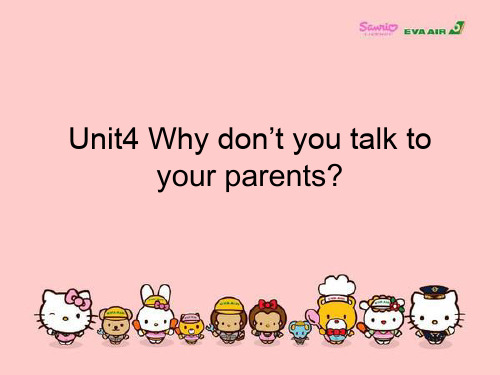
• 16. compete v竞争;对抗 → competition n 竞争 • compete with sb. 和某人竞争 • 17. improve =make ... better 改进 →improvement n 提高 • 18. opinion n 意见;想法;看法 • in one’ opinion 以某人的观点;在某人看 来 • 19. Thy Taylors 泰勒一家 。 在姓氏的复数 前加冠词the表示“全家人或夫妻两人”
Unit4 Why don’t you talk to your parents?
1用于提建议的句型有: • (1)What about doing sth ?=How about doing sth? ….怎么样? • (2)Why don’t you do sth?= Why not do sth? 为什么不呢? • (3)Let’s do sth.让我们一起做某事吧。 • (4)Would you mind doing sth?你介意做 某事吗?
• • • • • • • • • • • •
一、重点短语 1. have free time有空闲时间 2. allow sb. to do sth. 允许某人做某事 3. hang out with sb. 与某人闲逛 4. talk to sb. 与某人交谈 5. get into a fight with sb.与某人吵架/打架 6. study too much学得过多 7. too many太多 8. write sb. a letter给某人写信 9. look through翻看 10. be angry with sb. 生某人的气 11. work out成功地发展;解决
• • • • • • • • • • •
人教版新目标英语八年级下册Unit4 教材解读
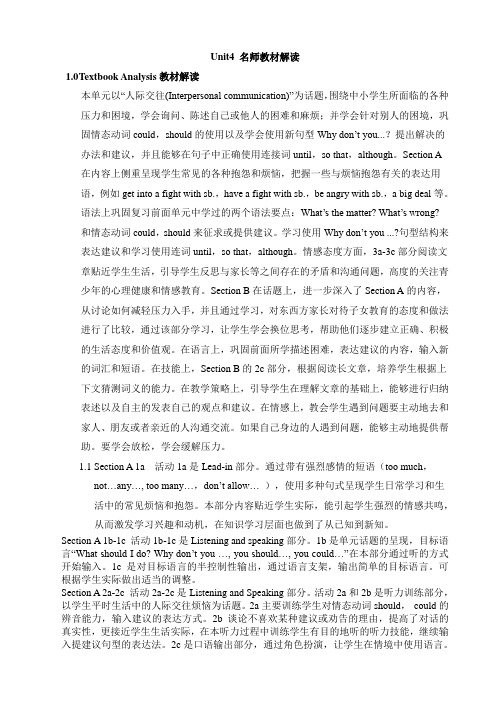
Unit4 名师教材解读1.0T extbook Analysis教材解读本单元以“人际交往(Interpersonal communication)”为话题,围绕中小学生所面临的各种压力和困境,学会询问、陈述自己或他人的困难和麻烦;并学会针对别人的困境,巩固情态动词could,should的使用以及学会使用新句型Why don’t you...?提出解决的办法和建议,并且能够在句子中正确使用连接词until,so that,although。
Section A 在内容上侧重呈现学生常见的各种抱怨和烦恼,把握一些与烦恼抱怨有关的表达用语,例如get into a fight with sb.,have a fight with sb.,be angry with sb.,a big deal等。
语法上巩固复习前面单元中学过的两个语法要点:What’s the matter? What’s wrong?和情态动词could,should来征求或提供建议。
学习使用Why don’t you ...?句型结构来表达建议和学习使用连词until,so that,although。
情感态度方面,3a-3c部分阅读文章贴近学生生活,引导学生反思与家长等之间存在的矛盾和沟通问题,高度的关注青少年的心理健康和情感教育。
Section B在话题上,进一步深入了Section A的内容,从讨论如何减轻压力入手,并且通过学习,对东西方家长对待子女教育的态度和做法进行了比较,通过该部分学习,让学生学会换位思考,帮助他们逐步建立正确、积极的生活态度和价值观。
在语言上,巩固前面所学描述困难,表达建议的内容,输入新的词汇和短语。
在技能上,Section B的2c部分,根据阅读长文章,培养学生根据上下文猜测词义的能力。
在教学策略上,引导学生在理解文章的基础上,能够进行归纳表述以及自主的发表自己的观点和建议。
在情感上,教会学生遇到问题要主动地去和家人、朋友或者亲近的人沟通交流。
人教版八年级下册英语教案unit4
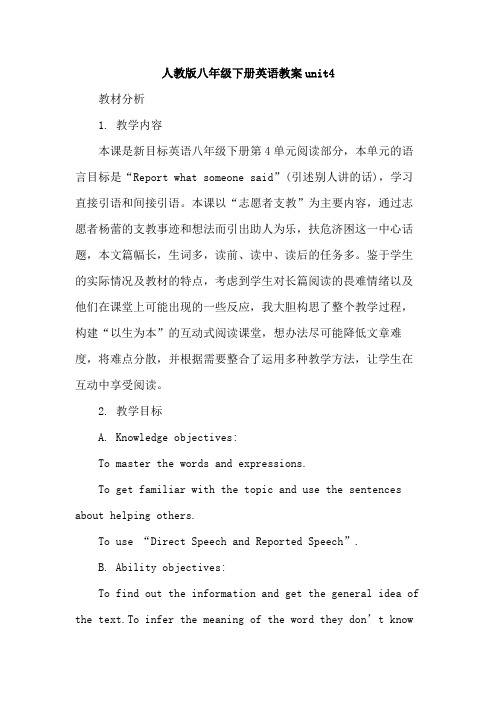
人教版八年级下册英语教案unit4教材分析1. 教学内容本课是新目标英语八年级下册第4单元阅读部分,本单元的语言目标是“Report what someone said”(引述别人讲的话),学习直接引语和间接引语。
本课以“志愿者支教”为主要内容,通过志愿者杨蕾的支教事迹和想法而引出助人为乐,扶危济困这一中心话题,本文篇幅长,生词多,读前、读中、读后的任务多。
鉴于学生的实际情况及教材的特点,考虑到学生对长篇阅读的畏难情绪以及他们在课堂上可能出现的一些反应,我大胆构思了整个教学过程,构建“以生为本”的互动式阅读课堂,想办法尽可能降低文章难度,将难点分散,并根据需要整合了运用多种教学方法,让学生在互动中享受阅读。
2. 教学目标A. Knowledge objectives:To master the words and expressions.To get familiar with the topic and use the sentences about helping others.To use “Direct Speech and Reported Speech”.B. Ability objectives:To find out the information and get the general idea of th e text.To infer the meaning of the word they don’t knowfrom the context.C. Affective objectives:Students are to realize the importance of helping others and they are encouraged to help others.Students’ team spirit will be improved by completing a certain task together.By understanding the life in rural areas, students are to realize how happy they are.3. 教学策略:(1)兴趣激发策略。
Unit4知识点讲解课件人教版八年级英语下册

● —Right. 5G willan ever.
● A. download
B. downloads C. to download D. downloading
● 2. Jenny is afraid to travel by plane. She always feels it.
●
●municate ●考点:① v.交流;沟通 ● ② communication n.交流;沟通 ●搭配: ●communicate with sb与某人交流 ●=have a communication with sb
●3.elder
●考点:① adj.年级较长的
●
② old--elder-eldest
B. because
C. or
D. so that
● 4. —How will she deal with the work?
● —She doesn't want to do it by herself. She wants to ask someone else to do it, .
● A. yet
B. instead C. too
D. either
● (一)单项选择
● 5. Lucy drank sleepy.
coffee so she couldn't sleep well last night. Today she feels
● A. too much; much too B. too much; too much
人教版英语八年级下册
Unit 4 Why don’t you talk to your parents? 知识点详解
By Nancy
Unit-4-单元模块复习课件(含重点单词短语句型-语法-高频考点-对接中考)人教版英语八年级下册

38. give one’ s opinion 提出某人的观点
39. learn exam skills 学习应试技巧
40. practice sports
体育训练
41. cause stress
造成压力
42. cut out
删除
9
1单元基础读背
四、重点句型复习
1. I studied until midnight last night so I didn’t get enough sleep.
17
2单元语法回顾
三、状语从句
until\till 引导的时间状语从句 A 动词是延续性动词,主句为肯定 I‘ll wait for you till you come to see me. B 动词是非延续性动词 not…until I didn’t go to bed until I finished my homework.
2. allow sb. to do sth. 允许某人做某事
3. hang out with sb. 与某人闲逛
4. after-school classes课外活动课
5. get into a fight with sb. 与某人吵架/ 打架
6. until midnight
直到半夜
7. talk to sb.
4.—Do you like your new neighbors? —No. The____ between us are getting worse, I think. A. opinions B.relations C.spirits D.results
5.—Did you call him up last night? —No. I didn't. I wrote him a letter__ .
人教版八年级英语下Unit 4 初中八年级下册英语教案教学设计课后反思
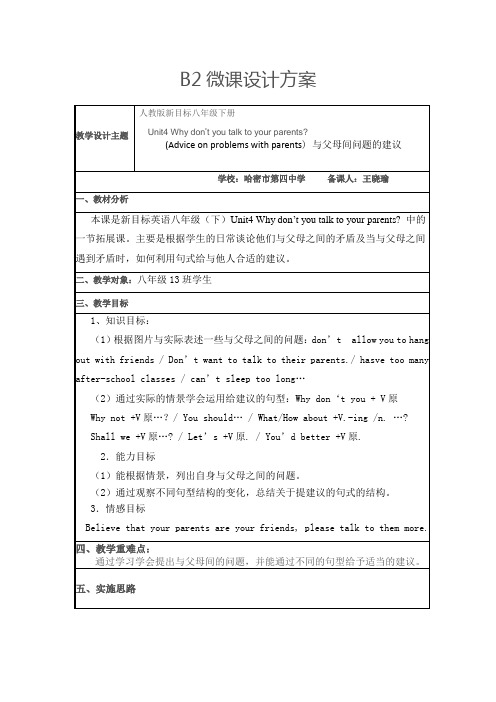
Step6.Feedback
Do some exercises.
1. Why not ______ her a scarf?
A. get B. to get C. getting D. gets
2. A nice day, isn’t it?
Yes, _____going for a picnic and relax ourselves?
A. Would you like B. Why not
C. What about D. why don’t
3.为什么你不跟你父母道歉呢?
____ ____ _____ say sorry to your parents?
4. Why don’t you read more books?(同义句转换)
Step2Let’s Watch
1.Watch a video together about a little boy’s life.
2.Afterwatching,talk about the problems the boy met with his parents and feelings.
Step3Let’s Talk
二、教学对象:八年级13班学生
三、教学目标
1、知识目标:
(1)根据图片与实际表述一些与父母之间的问题:don’t allow you to hang out with friends/Don’t want to talk to their parents./hasvetoo many after-schoolclasses/can’t sleep too long…
B2微课设计方案
教学设计主题
人教版八年级下册英语Unit4教学设计
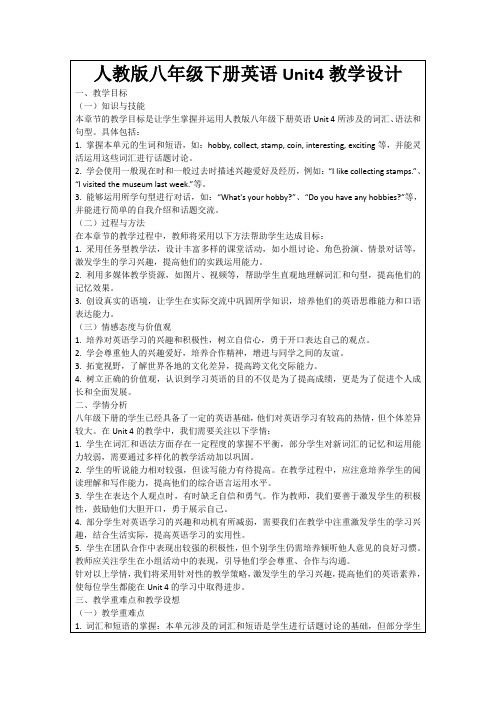
八年级下册的学生已经具备了一定的英语基础,他们对英语学习有较高的热情,但个体差异较大。在Unit 4的教学中,我们需要关注以下学情:
1.学生在词汇和语法方面存在一定程度的掌握不平衡,部分学生对新词汇的记忆和运用能力较弱,需要通过多样化的教学活动加以巩固。
2.学生的听说能力相对较强,但读写能力有待提高。在教学过程中,应注意培养学生的阅读理解和写作能力,提高他们的综合语言运用水平。
(五)总结归纳
1.教师引导学生回顾本节课所学的内容,总结一般现在时和一般过去时的用法,以及如何用所学词汇和句型描述兴趣爱好。
2.学生分享自己在课堂上的收获和感受,反思学习过程中的优点和不足。
3.教师对学生的表现给予积极的评价,鼓励他们在课后继续练习,提高英语水平。
4.布置课后作业,要求学生运用所学知识编写一篇关于自己兴趣爱好的小短文,巩固课堂所学。
2.学会使用一般现在时和一般过去时描述兴趣爱好及经历,例如:“I like collecting stamps.”、“I visited the museum last week.”等。
3.能够运用所学句型进行对话,如:“What's your hobby?”、“Do you have any hobbies?”等,并能进行简单的自我介绍和话题交流。
3.口语表达能力的提升:学生在表达个人观点时,有时会出现思路不清晰、语言表达不准确的问题。
教学设想:开展课堂讨论、小组合作等活动,鼓励学生大胆开口,培养他们的口语表达能力。同时,给予学生适当的反馈和指导,帮助他们提高语言表达的准确性。
(二)教学设想
1.采用情境教学法,将学生置身于真实的语境中,让他们在实际交流中学习英语,提高语言运用能力。
6.定期进行课堂评价,关注学生的学习进度,及时调整教学策略,以提高教学效果。
人教版八年级下册英语Unit 4 知识点语法归纳总结

Unit 4 Why don’t you talk to your parents?1.短语归纳2.典句必背3.用法集萃(1)My parents don't allow me to hang out with my friends. 我的父母不允许我和我的朋友们出去闲逛。
❖allow作动词,意为“允许;准许”。
allow sb. to do sth. 意为“允许某人做某事”,也可以是allow sb. sth.例:His parents won't allow him to stay out late. 他的父母不允许他在外面待到很晚。
Each passenger is allowed 20 kilograms of baggage. 每位旅客准许携带20千克行李。
❖allow sb. to do sth.的被动结构是:“sb. be allowed to do sth.” 某人被允许做某事例:We are allowed to choose our own clothes. 我们被允许选择自己的衣服。
The children are not allowed to play on this lawn. 孩子们不准在这块草地上玩耍。
(2)What’s wrong?怎么了?❖wrong作形容词,意为“有毛病的;错误的”例:There’s something wrong with my bike. 我的自行车出毛病了。
I’m sorry to tell you that your answers are wrong. 我很遗憾地告诉你,你的答案错了。
❖拓展:wrong的延伸(3)I’m really tired because I studied until midnight last night.我真的很累,因为我昨天晚上一直学习到半夜。
❖because是连词,意为“因为”,引导原因状语从句。
Unit 4知识点讲解人教版英语八年级下册

Your best friend doesnottrust youanymore.
你最好的朋友不再信任你了。
26.member /ˈmembə(r)/n.成员;分子
mem+ber
If youhave problems, you should talk to parents or otherfamilymembers.
31.typical /ˈtɪpɪkl/adj.典型的
typi+cal
The Taylorsare atypicalAmerican family.
泰勒一家是典型的美国家庭。
32.footballn.(美式)橄榄球;足球
foot+ball
I take one of my two boys tobasketball practiceand my daughter tofootballtraining.
I have tocompetewithmy classmates at school.
在学校我得和同学们竞争。
29.opinion /əˈpɪnɪən/n.意见;想法;看法
o+pin+ion
Whogives theiropinionsabout the problem?
谁给出了他们对于这个问题的看法?
依我看,家长们倾听孩子们的问题是很重要的。
43.perhaps/pəˋhæps/adv.可能;大概;也许
放在句首,相当于maybe
Perhapschildren should do some housework.
也许孩子们应该做些家务。
9.relation /rɪˈleɪʃn/n.关系;联系;交往
人教版英语八年级下册Unit 4 Why don’t you talk to your parents课文知识点总结
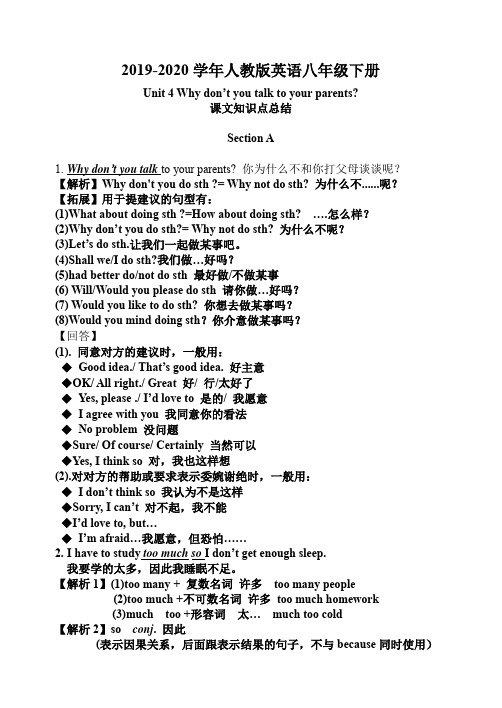
2019-2020学年人教版英语八年级下册Unit 4 Why don’t you talk to your parents?课文知识点总结Section A1.Why don’t you talk to your parents? 你为什么不和你打父母谈谈呢?【解析】Why don't you do sth ?= Why not do sth? 为什么不......呢?【拓展】用于提建议的句型有:(1)What about doing sth ?=How about doing sth? ….怎么样?(2)Why don’t you do sth?= Why not do sth? 为什么不呢?(3)Let’s do sth.让我们一起做某事吧。
(4)Shall we/I do sth?我们做…好吗?(5)had better do/not do sth 最好做/不做某事(6) Will/Would you please do sth 请你做…好吗?(7) Would you like to do sth? 你想去做某事吗?(8)Would you mind doing sth?你介意做某事吗?【回答】(1). 同意对方的建议时,一般用:◆Good idea./ That’s good idea. 好主意◆OK/ All right./ Great 好/ 行/太好了◆Yes, please ./ I’d love to 是的/ 我愿意◆I agree with you 我同意你的看法◆No problem 没问题◆Sure/ Of course/ Certainly 当然可以◆Yes, I think so 对,我也这样想(2).对对方的帮助或要求表示委婉谢绝时,一般用:◆I don’t think so 我认为不是这样◆Sorry, I can’t 对不起,我不能◆I’d love to, but…◆I’m afraid…我愿意,但恐怕……2.I have to study too much so I don’t get enough sleep.我要学的太多,因此我睡眠不足。
人教版八年级英语下册Unit4SectionA(3a3c)教学设计

3.观察身边的餐厅,了解餐厅的基本布局和菜单,用英语描述一家你熟悉的餐厅,包括餐厅的名称、位置、特色菜品等。
4.拍摄一段餐厅点餐的视频,与同学分享,互相学习,提高口语表达能力。
5.预习下一节课的内容,提前了解相关词汇和语法,为课堂学习做好准备。
(四)课堂练习
1.填空练习:设计填空题,让学生运用新学的词汇和语法知识完成练习。
2.改错练习:设计改错题,检验学生对语法知识的掌握程度。
3.阅读理解:设计阅读理解题,让学生从文中获取关键信息,提高阅读能力。
4.口语练习:创设餐厅点餐情境,让学生进行角色扮演,练习口语表达。
(五)总结归纳
1.教师总结:对本节课所学词汇、语法和阅读技巧进行总结,强调重点知识。
4.学生在阅读理解方面的能力,教师应引导学生关注课文细节,培养他们获取关键信息的能力。
5.学生在团队合作方面的表现,教师应关注学生在小组活动中的参与度,培养他们的团队协作能力。
三、教学重难点和教学设想
(一)教学重难点
1.词汇和语法:本节课的新词汇和语法是教学的重点,尤其是餐厅场景相关词汇和一般现在时态的运用,以及There be...句型的掌握。学生需要在实际语境中灵活运用这些词汇和语法,以提高口语表达能力。
设想:创设餐厅点餐的情境,让学生进行角色扮演,教师适时给予指导和鼓励,提高学生的口语表达能力。
(二)教学设想
1.导入:通过播放一段餐厅点餐的视频,激发学生的兴趣,引出本节课的话题。
2.新课内容呈现:采用情景教学法,展示餐厅实景图片,结合单词卡片、例句和课文,呈现新课内容。
3.课堂活动设计:
(1)词汇学习:采用单词卡片、例句和作业:设计具有针对性和实践性的作业,如:编写一段餐厅点餐的对话,巩固所学知识。
- 1、下载文档前请自行甄别文档内容的完整性,平台不提供额外的编辑、内容补充、找答案等附加服务。
- 2、"仅部分预览"的文档,不可在线预览部分如存在完整性等问题,可反馈申请退款(可完整预览的文档不适用该条件!)。
- 3、如文档侵犯您的权益,请联系客服反馈,我们会尽快为您处理(人工客服工作时间:9:00-18:30)。
Unit4 Why don't you talk to your parents?名词:
deal 交易
relation 关系communication 交流cloud 云member 成员
pressure 压力
opinion 意见
skill 技巧;能力
football 足球
development 发展
动词:
allow 允许guess 猜测argue 争吵
offer 提出;给予communicate 交流explain 解释
copy 抄袭
return 归还
complete 竞争
continue 持续
compare 比较
push 推;推动
cause 造成
形容词:
wrong 错误的elder 年级较大的nervous 焦虑的proper 正确的;恰当的
clear 清楚的
typical 典型的
quick 快的
crazy 疯狂的
usual 通常的
副词:
instead 代替;反而secondly 第二;其次anymore 再也不perhaps 可能;大概
代词:whatever 任何短语:
look through 浏览big deal 重要的事work out 解决
get on with 和睦相处cut out 删除compare…with…比较
in one's opinion 依某人看
知识点:
1、allow sb to do sth 允许某人做某事
allow doing sth 允许做某事
Please allow me to introduce myself. 请允许我做一下自我介绍。
We don't allow eating in the classroom. 不允许在教室里吃东西。
2、What's wrong?=What's the matter?怎么了?
What's wrong with sb??=What's the matter with sb?某人怎么了
3、be good for sth对……有益反义词:be bad for 对……有害
be good to sb/sth对……友好
be good at doing sth 擅长
Playing sports is good for your health. 做运动对你的健康有益。
She is good to her classmates. 她对她的同学很友好。
She is good at speaking Japanese. 她擅长说日语。
4、big deal 重要的事
It's not a big deal. 这没什么大不了的。
5、argue with sb 与某人争吵
She always argues with her boyfriend. 她总是和她男朋友吵架。
6、communicate with sb 和某人交流/沟通
Tom often communicates with his friends by e-mail. Tom经常和他朋友用邮件沟通。
7、提建议句型:
Why don't you do sth?=Why not do sth?你为什么不……?
Shall we do sth?我们……好吗?
Let's do sth. 让我们……吧。
You/We had better do sth. 你(们)/我们最好做某事
You/We should do sth. 你(们)/我们应该做某事
You/We could do sth. 你(们)/我们可以做某事
Would like to do sth/sth. 你想要……吗?
What/How about doing sth?……怎么样?
肯定回答:
Good idea./That's a good idea.好主意。
OK./All right./Great.好。
No problem.没问题。
Sure./Of course./Certainly.当然可以。
I can't agree more.我非常同意。
Yes, I think so.好的,我也这样认为。
否定回答:
I don't think so.我不这样认为
Sorry, I can't.对不起,我不能。
I'd love/like to, but……我很乐意,但是……
I'm afraid……我恐怕……
What a pity!I have to do sth.真遗憾!我得……
8、until直到……
not……until……直到……才……
I'll stay here until you come back. 我会待在这里,直到你回来。
I didn't go to bed until my Mum came back. 直到妈妈回来我才上床睡觉。
9、so that 为了,以便
I took a taxi so that I could get there earlier. 我打了一辆出租车,为的是能早点到那。
10、although=though 尽管,虽然和but不能连用
Although/Though he was ill, he still went to school.尽管他生病了,他还是去学校了。
He was ill, but he still went to school. 虽然他生病了,但是他还是去学校了。
